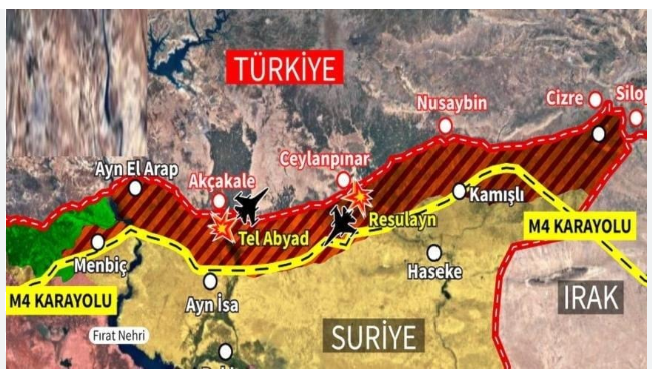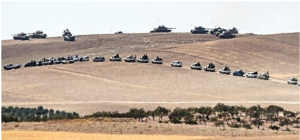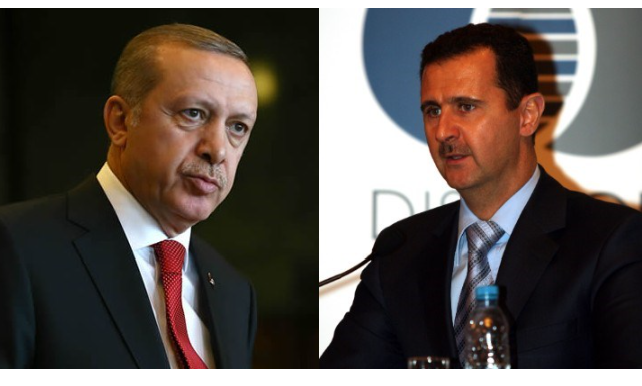Türkiye and Syria have engaged in diplomatic efforts to repair their broken relations, but reconciliation requires time and patience as long as Turkish troops are present in northern Syria, experts said.
With the mediation of Russia which is militarily supporting Syria, Ankara and Damascus are edging toward rapprochement with several trilateral meetings held in the past year in Moscow.
Turkish President Recep Tayyip Erdogan has said he could meet his Syrian counterpart Bashar al-Assad and “reset” relations with Damascus which were cut in the wake of the Syrian civil war in 2011.
Following his re-election on May 28, Erdogan is doubling down on efforts to mend frayed ties with Damascus.

The appointment of former Turkish intelligence chief Hakan Fidan as foreign minister is widely seen as a positive development, as Fidan, being present in recent key meetings with Syrian officials, was seen instrumental in Türkiye’s normalization drive.
“The Turkish-Syrian normalization will take time, probably months or years, but there is increasing hope in this regard,” Selcuk Colakoglu, the founding director of the Ankara-based Center for Asia-Pacific Studies, told Xinhua in a recent interview.

However, Syria’s demand for a withdrawal of Turkish forces from its territory is not going to be met any time soon even though Damascus has made it a precondition for further normalizing steps, Colakoglu noted.
Since 2021, the Turkish leader has been on a dovish track in its Middle East foreign policy, first achieving rapprochement with Israel, Saudi Arabia and the United Arab Emirates, and then inching closer to normalization of ties with Egypt and Syria.
While ties with Egypt are on the mend, Türkiye and Syria still have fundamental barriers to overcome before a mutually acceptable agreement can be reached.
The Syrian leader said in mid-March during a visit to Moscow that he will only meet Erdogan if Türkiye withdraws its troops from Syria.
“What significance would any kind of meeting have … if it doesn’t lead to a conclusion of the war in Syria? ” Assad, who described Türkiye as an “occupying state,” told Russia’s state-run RIA Novosti agency.
Since 2016, Türkiye has carried out four military operations in northern Syria, targeting Kurdish-controlled areas and the Islamic State militants. It currently controls swaths of land and has set up several small military bases in Syria’s Idlib and other northern provinces.
A new operation threatened in 2022 by Erdogan has not materialized following opposition by Russia, the United States and Iran.
Speaking of Syria’s recovered membership in the Arab League last month, a Turkish diplomatic source told Xinhua on the condition of anonymity that “with a shared border of 911 km, Türkiye differs from Arab nations that have welcomed Syria.”
“It is not realistic to ask for a withdrawal of Turkish forces as long as Türkiye’s security concerns (Kurdish militants) persist in northern Syria,” the source pointed out.
“But in time differences can be overcome,” the source added.
Hasan Unal, a foreign policy analyst and scholar from Istanbul’s Maltepe University, believes that a progressive withdrawal should be considered despite all the concerns.
“It’s normal that the Syrian president demands a withdrawal, but we have gone there to neutralize terrorists and not to occupy this land,” he argued in a flood of tweets.
“A gradual retreat should be set in motion,” Unal noted.
In addition to the withdrawal issue, Ankara’s support for some opposition forces against the Damascus government is considered an equally sharp thorn in the path toward reconciliation.
Despite that, reconciliation is seen as crucial for Turkish domestic politics as this would help to alleviate anti-Syrian sentiment in society when 3.7 million Syrian refugees and hundreds of thousands of other migrants and refugees are present in Türkiye, which is experiencing serious economic woes.
It is worth noting that the issue of a “voluntary repatriation” of refugees has for the first time figured in the communique of the National Security Council held on June 8 under his leadership.
“Türkiye has around 5 million refugees or migrants in the country. So, in times of economic hardships, the Turkish public increasingly demands the government send back refugees,” said Ankara-based analyst Colakoglu. ■
Follow our English language YouTube videos @ REAL TURKEY: https://www.youtube.com/channel/UCKpFJB4GFiNkhmpVZQ_d9Rg
And content at Twitter: @AtillaEng
Facebook: Real Turkey Channel: https://www.facebook.com/realturkeychannel/
